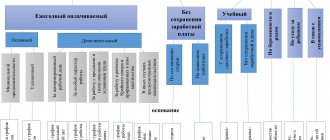Labor disputes due to non-provision of leave are an increasingly common occurrence today. They arise for various reasons, the main one of which is the lack of an approved vacation schedule. According to the laws of the Russian Federation, all companies must have such schedules, and they should be approved for the next year annually and no later than mid-December.
As a rule, these violations are noted in private organizations where employees are sent on leave with the permission of their superiors - written or oral.
What to do if the vacation you were entitled to did not become a happy reality?
Does a manager have the right to forget (ignore) his responsibilities? What does the law say?
- The duration of leave is determined by law. Each officially employed employee must annually go on vacation (approx. - paid, Article 114 of the Labor Code, Article 122 Part 1 of the Labor Code) for 28 days (Article 115 of the Labor Code) while maintaining both the average salary and his position. The vacation period for minors is 31 days. The Labor Code also provides for the employee’s right to use and the duration of study leave.
- 28 days of vacation can be used once or divided into 2 vacations of 14 days , which must be provided within 1 working year.
- If the employer, after a year of work for his employee, has not exercised his right to leave , the employee has the right to do this independently. Why? Because the exercise of the right to vacation is determined by the legislator, and not by the employer: every employee after 6 months of official work has the right to 14 days of vacation. From the 2nd and following year of work, the manager provides vacation (28 days) to his employee according to the schedule and sequence of vacations.
- Employees under 18 years of age can go on vacation before the end of their six-month period of work employees who adopted babies under 3 months of age; and women before/after maternity leave. Employees from the listed categories independently determine their vacation time when submitting a corresponding application to management.
- The absence of a vacation schedule in a company implies the independent exercise of the right to vacation by an employee with his independent determination of a convenient time for this vacation. Moreover, management’s disagreement with the period of time chosen for vacation does not matter and is not at all an obstacle to going on vacation. True, you will have to warn management about this in writing a couple of weeks before the long-awaited “vacation”.
- The employer is also obliged to warn its employees about vacations a maximum of 2 weeks before they occur and in writing (Article 123, Part 3 of the Labor Code). If the manager did not warn the employee, as required, 2 weeks in advance, then the employee has the right to move his vacation time forward by 2 weeks required by law.
- The time for using vacation may well be determined by agreement between the employee and management. But such an agreement must take into account the nuances of the law. That is, the manager does not have the right to worsen the conditions for the implementation of vacation (for example, to give a shorter vacation than required by law).
- Lack of vacation for 2 years in a row against the employee’s wishes is a gross violation of the law (Article 123-124 of the Labor Code).
- If the vacation was never used , then it is “carried over” to the next year (that is, added to the next year’s vacation). It is legally impossible to exchange your vacation for monetary compensation. But in the event of a layoff or dismissal, the employer is obliged to compensate you in money for the vacation that you did not take.
- When working in hazardous production or with irregular working hours, the employer is obliged to provide you with additional leave (also paid), the duration of which must be at least 3 days (it is recorded in the internal labor rules/schedule or in the team/contract). This additional leave may be replaced by monetary compensation.
Is the manager required to sign a leave application for a part-time employee?
Important!
In exceptional cases, when an employee going on vacation in the current working year may adversely affect the work of an enterprise or individual entrepreneur, the vacation with the consent of the employee can be postponed to the next working year. It is important to take into account that the employee must take this leave off during the working year following the one for which the leave was granted. Note! If the employer categorically refuses to accept the application from the employee, then the latter should send the application by letter with a list of the attachments and a notification of receipt.
How to fight for your rights?
- The manager has the right not to allow you to go on vacation if it is included in the schedule only if you yourself have given your consent. And then, only on the condition that you received your last year’s vacation and took the full vacation. 2 years without vacation is a gross violation of Article 123-124 of the Labor Code.
- Don’t rush to immediately poke your bosses in the nose with the Labor Code. First, try to resolve the issue peacefully and find a compromise. Maybe it is possible to postpone your vacation by a couple of weeks so that you can finish some important work (this will only add points to your “karma” for career growth), or do it ahead of schedule (if there is no one to replace you). Or you can, for example, do some urgent work right during your vacation (you can conclude a civil contract for this case). If management does not want to let you go for a whole month, split your vacation into 2 (or more) periods. And if the company has financial problems, offer to divide the payment of vacation pay: part - before the vacation and the rest - after.
- Is it impossible to achieve a compromise? And your boss stubbornly refuses to give you vacation? Write a vacation application and submit it 2 weeks before your vacation. Management refuses to sign it? Remind him in writing (exceptionally politely) that he is violating your legal rights, according to Article 123-124 of the Labor Code. You can also remind about a fine of 30,000-50,000 rubles. (Article 5.27 of the Administrative Code) and administrative liability for violation of workers’ rights. This written claim is drawn up in 2 copies and takes into account Art. 22, 115, 122-125 Labor Code, Article 37, paragraph 5 of the Constitution.
- And the complaint didn’t help? Then all that remains is to appeal to the State Labor Inspectorate (as well as to the prosecutor’s office and the court).
If you are employed unofficially and are not given leave...
Even with “unofficial” employment of an employee, the employer must necessarily draw up an employment contract. This is given 3 days from the moment the employee is allowed to work. That is, direct labor relations arise from the moment the employee starts working, and he (together with the employer) is subject to all relevant provisions of the Labor Code.
As for vacation or time off at his own expense, the employee is entitled to it at any time under an existing agreement with the employer after six months of continuous work (exceptions are defined in Article 128 of the Labor Code).
If the legal right to leave is violated, the employee can safely file a complaint with the State Labor Inspectorate and additionally indicate a request for non-disclosure of personal data (to avoid retaliation from management).
When is a leave application required?
What to do if you don’t sign a vacation application
At the same time, an employee, if there are valid reasons (which are not specified in the norms of the Labor Code of the Russian Federation as grounds for postponing vacation), has the right to apply for vacation at a convenient time without taking into account the vacation schedule. In this case, the employer does not sign the application for leave if he does not want to do so and, accordingly, refuses to grant it without any legal consequences for himself.
If you are employed under a contract agreement, but they don’t give you vacation...
According to the laws, the basis for the emergence of labor relations between an employer and an employee is an employment contract. It is precisely this “employee/employer” relationship that is subject to all norms of labor law, including payment of sick leave, vacations, etc.
As for the contract, it already relates to contractual relations, which, in turn, are regulated by the Civil Code of the Russian Federation. That is, everyone who works under a contract is deprived of their right to vacation (sick leave, vacation pay, etc.) .
Of course, this type of work is very beneficial for the employer, but it is worth noting that a civil law contract can also become an employment contract - through the court, at the request of the employee, or at the request of the State Labor Inspectorate. And if the court recognizes this contract as an employment contract , then the employer will have to issue a work book to his employee and provide all benefits, including vacation (plus pay unpaid amounts for benefits - sick leave, vacations, etc.).
Contact the State Labor Inspectorate
- How to find the State/Labor Inspectorate? All addresses in the regions today can be easily found on the Internet. For example, here - www.rostrud.info
- Who can apply? Any citizen, employee group or trade union.
- We write a complaint against the employer (if you don’t want to “shine” your name, you can ask for an inspection without indicating your full name - anonymously, Article 358 of the Labor Code) in any form, describing the essence of your problem as clearly and in detail as possible. Be sure to provide all information in full (inspectors do not consider anonymous information). We hand this complaint directly into the hands of the inspector or send it by mail (note - registered, with acknowledgment of receipt).
- Time limit for consideration of the complaint. As a rule, such applications are processed quickly - no more than 15 days.
- The maximum period is 1 month. True, in megacities, a complaint can wait up to six months for consideration, due to the heavy workload of inspectors.
- After the complaint, your company is visited by a commission , and the inspector carefully checks the purity and legality of compliance with all standards for the provision of leave for all employees of the organization.
- After the inspection, based on its results , the manager is usually held accountable, in accordance with Article 5.27 of the Labor Code, thereby obliging him to immediately provide his employees with vacation according to the schedule.

Usually, after management is called to the prosecutor, all measures to return working conditions to the legal framework are taken by the employer immediately.
The vacation issue has been resolved, it’s time to pack your things for vacation according to the detailed list.
Have there been similar situations in your work? And how did you achieve your goal? Share your stories in the comments below!
Documenting
If there are grounds not to provide an employee with the leave he is entitled to, the execution of such an act must occur in accordance with the provisions of the laws of the Russian Federation governing labor relations:
- the director of the structural unit draws up a petition to attract a large number of employees for the efficiency of the enterprise’s production activities, since only with general coordination is it possible to fulfill the order on time,
- the boss issues an order, but before issuing it, the employee whose leave will be postponed must give his consent to such shifts in the schedule,
- at the end of the order, the employee signs as a sign of consent,
- as a result, the vacation or any of its parts is postponed to another time, which should also be indicated in the order.
Remember! The order must contain the grounds on which this particular employee must perform his job duties, and why his job functions cannot be replaced by someone else. The reason for the transfer should be described specifically and not undermine the validity of the employer’s actions.
If such conditions are not met during an inspection by authorized services, specialists may consider the refusal to provide scheduled leave an offense and hold the employer accountable.










